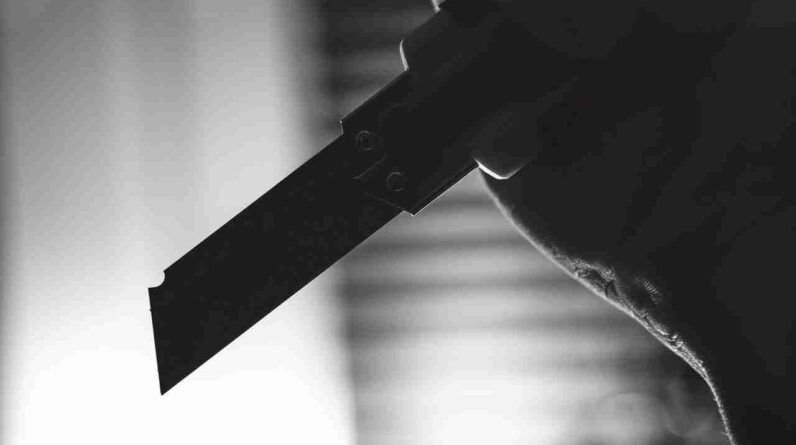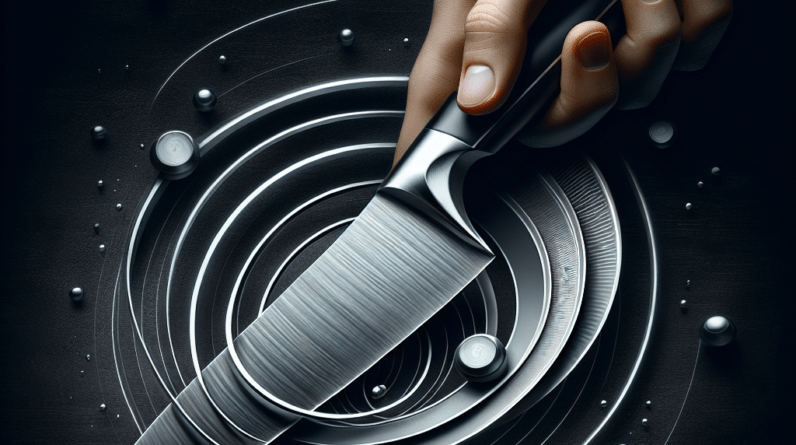Maintaining the pristine condition of a Damascus steel knife might seem like a daunting task, but fear not! In this article, we will guide you through the best practices and effective techniques to clean and care for your beloved Damascus steel knife. Whether you are a professional chef or an avid outdoorsman, achieving longevity and optimum performance from your knife is essential. So, join us as we uncover the secrets to keeping your Damascus steel knife in impeccable shape for years to come.
Cleaning a Damascus Steel Knife
Gently Handwash the Knife
Cleaning a Damascus steel knife requires a delicate touch to ensure the preservation of its beautiful pattern. We recommend handwashing the knife instead of using a dishwasher, as the harsh detergents and high temperatures can damage the blade. Gently rinse off any food debris or residue from the blade using warm water.
Use Mild Dish Soap and Warm Water
To effectively clean a Damascus steel knife, use a mild dish soap that is gentle on the metal. Avoid using abrasive or corrosive cleaners, as they can wear down the blade’s surface or affect the pattern. Create a soapy solution in a basin or sink with warm water and submerge the knife for a few minutes to loosen any stains or grime.
Avoid Soaking or Submerging the Knife
While it’s important to clean the knife thoroughly, it’s equally crucial to avoid soaking or submerging it for an extended period. Damascus steel is susceptible to corrosion if exposed to water for too long. Soaking the knife can also lead to the loosening of the handle or damaging the blade’s edge.
Dry the Knife Immediately
After washing the knife, dry it immediately with a clean, soft cloth to prevent water spots or rust from forming. Pay special attention to the handle and any crevices where moisture can accumulate. Ensuring the knife is completely dry before storing it helps maintain its quality and prevents any potential damage.
Remove Stains with Baking Soda Paste
If you notice stubborn stains on your Damascus steel knife, you can create a gentle cleaning paste using baking soda and water. Mix the two ingredients to form a thick paste and apply it to the stained areas. Gently scrub the stains with a soft cloth or sponge, being careful not to apply too much pressure. Rinse off the baking soda paste and dry the knife thoroughly.
Never Use Harsh Abrasives or Cleaners
When cleaning a Damascus steel knife, it is crucial to avoid using harsh abrasives or cleaners that can scratch or damage the blade. This includes steel wool, scouring pads, or abrasive powders. The unique patterns of Damascus steel are delicate and can be easily marred by rough cleaning techniques. Stick to mild cleaners and soft cloths to maintain the knife’s aesthetic appeal.
Regularly Oil the Blade
To keep your Damascus steel knife in optimal condition, it’s essential to regularly oil the blade. The oil acts as a protective barrier against moisture and helps prevent corrosion. Apply a few drops of food-grade mineral oil or dedicated knife oil to a clean cloth and rub it gently onto the blade, making sure to cover the entire surface. This simple step will help keep your knife looking and performing its best.
Storing the Damascus Steel Knife
Choose a Suitable Storage Location
Selecting an appropriate storage location for your Damascus steel knife is crucial for maintaining its integrity. Choose a spot that is dry, well-ventilated, and away from direct sunlight. Avoid storing the knife in damp or humid areas, such as near sinks or dishwashers, as exposure to moisture can lead to rust or corrosion.
Use a Knife Block or Magnetic Strip
To protect the blade and ensure the knife remains in optimal condition, consider using a knife block or magnetic strip for storage. These options safely hold the knife in place while preventing contact with other utensils or surfaces that could cause damage. Knife blocks also help maintain the knife’s sharpness by preventing the blade from coming into contact with hard surfaces.
Consider a Knife Sheath or Sleeve
If you prefer a more portable storage solution, consider using a knife sheath or sleeve. These protective covers provide an extra layer of protection for the blade and are especially useful when traveling or storing the knife in a drawer. Make sure the sheath or sleeve is clean and dry before inserting the knife to prevent any moisture buildup.
Keep the Knife Away from Moisture
As we’ve mentioned before, moisture is a Damascus steel knife’s worst enemy. To ensure the longevity and performance of your knife, keep it away from moisture as much as possible. Avoid storing the knife in a sink or leaving it in a wet environment. Moisture can cause the blade to rust or the handle to become loose over time.
Avoid Storing in Close Proximity to Other Utensils
To prevent accidental damage or scratches, it’s best to store your Damascus steel knife away from other utensils or kitchen tools. Contact with hard or metallic objects can lead to chipping or dulling of the blade. Choose a designated space that allows the knife to be stored separately and safely.
Regularly Inspect the Storage Area for Signs of Damage
Periodically check the storage area for any signs of damage that could impact the knife or its surroundings. Look for any sharp edges, loose screws, or rough surfaces that could potentially cause harm to the knife or compromise its integrity. By staying vigilant and addressing any issues promptly, you can maintain a safe and secure storage space for your Damascus steel knife.
Sharpening and Honing the Blade
Find a Suitable Sharpening Method
Maintaining a sharp edge is crucial for the performance of a Damascus steel knife. When sharpening a Damascus blade, you have several options. Traditional methods include using sharpening stones or honing rods, while electric knife sharpeners offer a quick and convenient alternative. Research different methods and choose the one that suits your preferences and skill level.
Use a Honing Rod for Regular Maintenance
For regular maintenance and to keep the blade sharp between sharpenings, a honing rod is an excellent tool. The honing rod helps realign the edge of the blade and remove any microscopic burrs that can affect cutting performance. Gently run the knife’s edge along the rod at a consistent angle, alternating sides until you feel the blade is restored to its optimal sharpness.
Consider Professional Sharpening Services
If you’re unsure about sharpening the knife yourself or want to ensure the best possible results, consider taking your Damascus steel knife to a professional sharpening service. These experts have the knowledge and experience to sharpen the blade without compromising its integrity or pattern. Professional sharpening services can also address any specific issues or concerns you may have about your knife.
Maintain the Original Blade Angle
When sharpening a Damascus steel knife, it’s crucial to maintain the original blade angle to preserve its performance and cutting ability. Different knives have different angles, so try to match the manufacturer’s recommended angle or the knife’s original edge profile. Consistency is key, so make sure to maintain the same angle throughout the sharpening process.
Practice Proper Sharpening Techniques
Sharpening a knife is a skill that improves with practice. Before sharpening your Damascus steel knife, familiarize yourself with proper techniques and ensure you have the necessary tools. Take your time and approach the process with patience and care. Consistency and even pressure are essential to achieve a sharp and consistent edge.
Avoid Over-Sharpening or Excessive Pressure
While it’s important to maintain a sharp edge, over-sharpening a Damascus steel knife can be detrimental. Applying excessive pressure or sharpening the blade too frequently can lead to wear and tear on the cutting edge. Be mindful of not removing more material from the blade than necessary, as this can shorten the knife’s lifespan.
Regularly Test the Knife’s Sharpness
After sharpening or honing your Damascus steel knife, it’s vital to test its sharpness. Be cautious when performing a sharpness test and ensure you have a secure grip on the knife. One common test is to gently glide the edge of the knife across a piece of paper. If the knife cuts smoothly and effortlessly, it is likely sharp enough for use. Regularly testing the knife’s sharpness will help you gauge when it’s time for maintenance.
Avoiding Common Mistakes
Do Not Use the Knife on Hard Surfaces
Damascus steel knives are designed for precise cutting rather than heavy-duty chopping or pounding on hard surfaces. Avoid using your Damascus steel knife on cutting boards made of glass, granite, or marble, as they can dull the blade quickly. Instead, use a cutting board made of wood, bamboo, or plastic to protect the blade and preserve its sharpness.
Avoid Cutting Frozen Foods or Bones
While Damascus steel is renowned for its strength and durability, it’s still important to avoid using the knife to cut through frozen foods or bones. These materials can put excessive strain on the blade and potentially cause it to chip, warp, or even break. Stick to using appropriate tools for tasks that involve hard or frozen ingredients.
Never Twist or Pry with the Blade
Damascus steel knives, like any other kitchen knife, are not intended to be used as prying or twisting tools. Applying sideways or twisting pressure on the blade can lead to damage, including chipping or even snapping off the tip. Always use the appropriate tools for the task at hand, and avoid subjecting your Damascus steel knife to unnecessary stress.
Do Not Leave the Knife in the Sink
Leaving your Damascus steel knife in the sink, even for a short period, is a risky practice. The knife can easily get lost among other utensils or end up damaging the blade’s edge when placing other items on top of it. Always clean the knife promptly and find a suitable storage location to prevent accidents or damage.
Avoid Dishwasher Cleaning
Damascus steel knives should never be cleaned in a dishwasher. The harsh detergents, high heat, and jostling from other utensils can damage the blade’s surface, handle, and overall structure. Handwashing the knife with mild dish soap and warm water is the safest and most effective way to clean it. Always remember to dry the knife immediately to prevent any potential damage from moisture.
Do Not Store the Knife Unprotected
To protect the blade from unnecessary wear and tear, never store your Damascus steel knife without proper protection. Leaving it in a drawer or on a countertop exposed to other objects can lead to scratches, chipping, or dulling of the edge. Always use a knife block, magnetic strip, sheath, or sleeve to prevent any accidental damage and maintain the knife’s condition.
Avoid Exposing the Knife to Extreme Temperatures
Damascus steel knives should not be exposed to extreme temperature conditions. Avoid leaving the knife in direct sunlight or near sources of heat, such as stoves or ovens. Extreme heat can cause the handle to expand or contract, compromising its stability. Similarly, exposing the knife to extreme cold temperatures can affect the sharpness and durability of the blade.
Maintaining the Handle
Clean Handle with Mild Soap and Water
When it comes to maintaining the handle of your Damascus steel knife, avoid using harsh chemicals or abrasive cleaners that can damage the material. Simply clean the handle with mild dish soap and warm water. Gently scrub the handle using a soft cloth or sponge, paying attention to any grooves or contours where dirt can accumulate.
Avoid Excessive Moisture
While cleaning the handle, be careful not to oversaturate it with water or expose it to excessive moisture. Prolonged exposure to moisture can cause wooden handles to swell or crack, while certain synthetic materials may degrade or lose their luster. Wipe off any excess moisture and dry the handle thoroughly to prevent damage.
Dry the Handle Immediately
After cleaning and drying the handle, make sure to dry it immediately to avoid any potential damage. Use a clean, dry cloth to remove any remaining moisture. Leaving the handle damp can lead to mold growth, deterioration of the material, or loosening of the handle scales over time.
Condition the Handle if Necessary
If your Damascus steel knife has a handle made of wood or other natural materials, consider conditioning it occasionally to keep it in prime condition. Using food-safe mineral oil or dedicated handle oil, apply a small amount to a clean cloth and rub it into the handle. This helps moisturize the wood, prevent drying or cracking, and enhance the natural beauty of the handle.
Handle Materials may Require Specific Care
Different handle materials may require specific care and maintenance. For example, wooden handles may benefit from periodic oiling, while synthetic handles can be cleaned with mild detergents. Familiarize yourself with the specific care instructions for your knife’s handle material to ensure you’re properly maintaining it and prolonging its lifespan.
Inspect and Repair Loose or Damaged Handles
Regularly inspect the handle of your Damascus steel knife for any signs of wear, loose parts, or damage. Loose or damaged handles can compromise the knife’s safety and performance. If you notice any issues, such as loose rivets or cracks, consider seeking professional assistance or contacting the manufacturer for repair or replacement options.
Protect the Handle from Harsh Chemicals
When using your Damascus steel knife in the kitchen, take care to protect the handle from contact with harsh chemicals, such as bleach or acidic substances. These chemicals can discolor or corrode certain handle materials, compromising their integrity. Use cutting boards or other protective measures to prevent direct contact between the handle and potentially harmful substances.
Dealing with Rust or Corrosion
Prevent Rust with Regular Cleaning and Oiling
Prevention is key when it comes to avoiding rust on your Damascus steel knife. Regularly cleaning, drying, and oiling the blade will create a protective barrier against moisture and minimize the risk of rust or corrosion. Make it a habit to clean and oil your knife after each use to maintain its pristine condition.
Remove Surface Rust with Vinegar or Lemon Juice
If you notice surface rust on your Damascus steel knife, you can use natural acidic solutions like vinegar or lemon juice to help remove it. Dip a non-abrasive cloth or brush into the vinegar or lemon juice and gently rub it onto the affected areas. Allow the solution to sit for a few minutes, then rinse the blade thoroughly. Dry the knife completely to prevent further rusting.
Use a Non-abrasive Cloth or Brush for Rust Removal
When removing rust from your Damascus steel knife, always utilize non-abrasive materials to protect the blade’s surface. Steel wool or abrasive brushes can scratch or damage the patterned layers of the blade. Instead, opt for soft cloths, sponges, or brushes specifically designed for delicate cleaning to remove rust without compromising the knife’s aesthetic appeal.
Apply a Protective Coating to Prevent Future Rust
After successfully removing surface rust, consider applying a protective coating to prevent future rust or corrosion. Food-grade mineral oil or dedicated knife oils can provide an additional layer of defense against moisture and oxygen. Apply a thin coat of oil to the blade and handle, ensuring even coverage, and wipe off any excess. This step helps maintain the blade’s longevity and performance.
Consider Using Rust Removers Specifically Designed for Knives
If you’re dealing with stubborn rust or corrosion and need a more potent solution, consider using rust removers specifically designed for knives. These products are formulated to remove rust without harming the blade’s surface or affecting its pattern. Follow the manufacturer’s instructions carefully and take necessary precautions to protect yourself from potentially harmful chemicals.
Consult Professionals for Deep Rust or Corrosion
In cases of deep rust or severe corrosion on your Damascus steel knife, it’s best to consult professionals for assistance. Trying to remove extensive rust yourself may lead to further damage or compromise the structural integrity of the blade. Professional knife restorers or experts can evaluate the extent of the damage and suggest appropriate methods for restoration.
Handling and Usage Tips
Avoid Excessive Force or Pressure
When using a Damascus steel knife, it’s important to avoid excessive force or pressure. Let the knife’s sharpness and design do the work for you. Applying excessive pressure can lead to accidents, such as the knife slipping or the blade getting damaged. Use a controlled motion and allow the knife to glide smoothly through the cutting material.
Use a Cutting Board to Protect the Blade
To protect your Damascus steel knife’s blade from unnecessary wear, always use a cutting board. Choose a cutting surface made of wood, bamboo, or plastic. Avoid cutting directly on hard or abrasive surfaces like glass, granite, or marble, as they can dull the blade quickly. By using a cutting board, you preserve the knife’s sharpness and prolong its lifespan.
Do Not Leave the Knife Unattended
For safety reasons, it’s crucial never to leave your Damascus steel knife unattended, especially around children or pets. Accidents can occur when knives are left unattended, leading to injuries or damage. Always keep a watchful eye on your knife and ensure it is stored securely when not in use.
Do Not Misuse the Knife as a Tool
A Damascus steel knife is designed for food preparation and should not be misused as a general-purpose tool. Using the knife for tasks outside of its intended purpose can lead to blade damage or injury. Avoid using the knife for opening cans, prying open containers, or any other tasks that could put excessive force or strain on the blade.
Avoid Storing the Knife Near Edges or Ledges
To prevent accidents and damage, avoid storing your Damascus steel knife near edges or ledges where it could easily fall or be knocked over. Placing the knife in a secure, designated storage area reduces the risk of it accidentally falling onto hard surfaces or injuring someone. Prioritize safety by storing the knife in a location where it won’t pose a hazard.
Never Catch a Falling Knife
One of the golden rules when handling a knife, regardless of its type, is to never attempt to catch a falling knife. Trying to catch a falling knife can result in severe injuries, such as cuts or punctures. Instead, step back and allow the knife to fall freely or land on a safe surface. Always prioritize safety and take precautions to prevent accidents.
Regularly Inspect for Loose or Damaged Parts
To ensure the safe and effective use of your Damascus steel knife, regularly inspect it for any signs of loose or damaged parts. Check for loose rivets, cracks in the handle, or any shifting of the blade. Identifying and addressing these issues promptly can prevent accidents and extend the lifespan of your knife.
Preventing and Removing Odors
Clean the Knife Regularly to Prevent Odor Build-up
To prevent unpleasant odors from developing, it’s essential to clean your Damascus steel knife regularly. Even if you don’t notice any visible dirt or residue, food particles can accumulate on the blade and handle over time, leading to odors. Incorporate regular cleaning into your knife maintenance routine to keep it fresh and odor-free.
Use Mild Detergent and Warm Water
When cleaning your knife to remove odors, use a mild detergent and warm water. Mild dish soap works well for this purpose. Create a soapy solution in a basin or sink and gently wash the knife, paying extra attention to the blade. Thoroughly rinse off the soap to remove any residue.
Disinfect the Knife with Vinegar or Lemon Juice
If you’re dealing with stubborn odors, natural disinfectants like vinegar or lemon juice can be effective solutions. Create a cleaning solution by mixing equal parts vinegar or lemon juice and water. Submerge the knife in the solution or apply it directly to the blade and allow it to sit for a few minutes. Rinse thoroughly and dry the knife completely.
Dry the Knife Thoroughly
Properly drying your Damascus steel knife is crucial in preventing odor build-up. After cleaning or rinsing the knife, thoroughly dry it with a clean cloth or towel. Pay attention to any crevices, corners, or hinges where moisture may linger. Ensuring the knife is completely dry before storage will help inhibit odor-causing bacteria growth.
Consider Using Baking Soda or Coffee Grounds to Remove Odors
If your Damascus steel knife has stubborn odors, consider using baking soda or coffee grounds, both of which are natural odor absorbers. Place the knife in a container with a small amount of baking soda or coffee grounds, making sure they do not come into direct contact with the blade. Leave it overnight, and the absorbent properties of these substances should help eliminate the odor.
Store the Knife in a Well-ventilated Area
To prevent odors from forming while the knife is in storage, choose a well-ventilated area. Adequate air circulation helps prevent moisture buildup and minimizes the chances of odors developing. Avoid storing the knife in closed compartments or areas where airflow is restricted.
Maintaining the Knife’s Aesthetic Appeal
Regularly Clean and Polish the Blade
To maintain the aesthetic appeal of your Damascus steel knife, it’s essential to regularly clean and polish the blade. After each use, gently clean the blade with mild dish soap and warm water to remove any food residues or stains. Dry it thoroughly, and periodically polish the blade using a soft cloth to enhance its luster and shine.
Use Non-abrasive Cleaning Materials
When cleaning your Damascus steel knife, always opt for non-abrasive materials to avoid scratching or damaging the blade’s surface. Soft cloths, sponges, or microfiber towels are excellent choices. Stay away from steel wool, scouring pads, or abrasive powders, as they can ruin the intricate patterns of the Damascus steel.
Remove Water Spots with Vinegar
To remove any water spots or mineral buildup that may accumulate on the blade over time, you can use vinegar as a natural cleaning agent. Create a solution of equal parts water and vinegar and gently rub it onto the affected areas with a soft cloth or sponge. Rinse the blade thoroughly, dry it properly, and, if necessary, polish it with a clean cloth.
Dry the Knife Properly to Prevent Water Marks
Properly drying your Damascus steel knife after cleaning or rinsing is crucial to prevent water marks from forming. When water is allowed to evaporate on the blade’s surface, it can leave behind unsightly residue or marks. After washing or rinsing the knife, ensure it is completely dry by using a clean, dry cloth or towel.
Avoid Scratching or Damaging the Blade’s Surface
When handling your Damascus steel knife, take care to avoid scratching or damaging the blade’s surface. Avoid using the knife on hard surfaces or cutting through bone or frozen foods. Use the knife as intended for precise cutting tasks and handle it with the necessary care to preserve its visual appeal.
Store the Knife Individually to Prevent Contact with Other Metals
To avoid potential damage from contact with other metals, consider storing your Damascus steel knife individually. When different metals come into contact, corrosion or discoloration may occur. By storing the knife separately, you can prevent these reactions and maintain the knife’s pristine appearance.
Consider Professional Polishing or Refinishing if Needed
If your Damascus steel knife starts to show signs of wear or loses its original luster, consider seeking professional polishing or refinishing services. These professionals specialize in restoring the visual appeal of knives and can help bring back the blade’s shine and enhance its unique patterns. Consult trusted experts or contact the knife manufacturer for suitable recommendations.
Additional Tips and Considerations
Follow Manufacturer’s Instructions if Available
If your Damascus steel knife comes with manufacturer’s instructions or specific care guidelines, make sure to follow them accordingly. Manufacturers are knowledgeable about their products and can provide valuable insights into how best to care for and maintain your knife.
Seek Advice from Knowledgeable Professionals
If you’re unsure or have any concerns about cleaning and maintaining your Damascus steel knife, don’t hesitate to seek advice from knowledgeable professionals. Knife experts, retailers, or reputable online communities can provide guidance and answer any specific questions you may have. Their insights can help you make informed decisions and ensure your knife remains in optimal condition.
Be Mindful of Knife’s Unique Characteristics
Damascus steel knives have unique characteristics that set them apart from other types of blades. The intricate patterns and layers in the blade require particular attention and care. Be mindful of these characteristics when cleaning, storing, or sharpening your knife to preserve its individuality and enhance its longevity.
Educate Yourself about Different Damascus Steel Types
Damascus steel comes in various forms, each with its own unique properties and care requirements. Educate yourself about the specific type of Damascus steel used for your knife, as different compositions and patterns may necessitate different care practices. Understanding the nuances will help you better maintain and care for your knife.
Invest in Quality Knife Maintenance Tools
To properly care for your Damascus steel knife, it’s essential to invest in quality knife maintenance tools. These may include sharpening stones or rods, cleaning brushes, rust removers, or storage solutions. Quality tools are designed specifically for knife care and can significantly contribute to the longevity and performance of your Damascus steel knife.
Develop a Regular Cleaning and Maintenance Routine
Consistency is key when it comes to caring for your Damascus steel knife. Establish a regular cleaning and maintenance routine that suits your needs and preferences. A well-maintained knife will not only retain its beauty but also perform consistently and reliably, enhancing your culinary experience.
Do Not Hesitate to Seek Professional Help
If you encounter challenges or need specialized assistance with your Damascus steel knife, do not hesitate to seek professional help. Knife restorers, sharpening services, or the manufacturer’s customer support can offer expert advice and solutions. It’s better to seek professional help than risk damaging your beloved knife through improper care or maintenance attempts.









